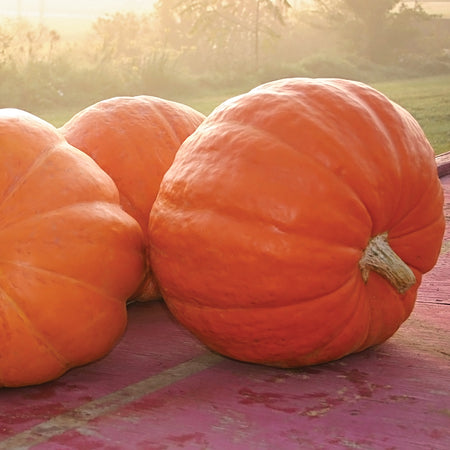Cucurbita maxima 110
days. This lumbering pumpkin is an undeniable stand-out in the garden
and field. The huge, heavy, radiant deep orange squash have defined ribs
that may develop a tan highlight. Topping out at a massive 50–125
pounds each, these giants are great for carving or straight off the
strong, rangy vines for attention-getting autumn displays. Approximately
2 seeds per gram.
Cucurbita spp. This traditional ornament of the autumn harvest is good for much more than jack-o-lanterns and pies. High in fiber and essential minerals, their colorful orange flesh signifies an abundance of the antioxidant beta-carotene.
Days to maturity are calculated from date of direct seeding.
Culture
• Pumpkins require uniform irrigation totaling 15-20 inches of water during the growing season
• Bee attractant flowers or beehives will help yields — misshapen or non-developing fruit is often the result of poor pollination
Direct Sowing
• Plant after frost danger when soil warms to 65°F
• Work in shovelful of compost and 1/2 cup TSC's Complete fertilizer into hill
• Keep soil evenly moist but not wet as too much moisture causes seed to rot
• Bush varieties: sow 3-4 feet apart
• Vining varieties: sow 4-5 feet apart
Transplanting
• Start indoors 3-4 weeks prior to anticipated transplant date in 4 inch pots
• Work in shovelful of compost and 1/2 cup TSC's Complete fertilizer into hill
• Transplant carefully as to not disturb roots
Pests & Diseases
• Common pests: Cucumber beetles and squash bugs, stink bugs
• Pest control: Pyrethrin
• Common diseases: Various wilts, leaf spots mildews, and various viral diseases
• Disease prevention: 3-4 year crop rotation, and fungicide applications
Harvest & Storage
• Leave on vine until fully mature, rinds should be firm
• Pumpkins can tolerate a light frost, but must be protected from a hard frost
• Dry gourds: Wash gently in a solution of 10 parts water and 1 part bleach, carefully removing all dirt, then store in a warm, dry location
• Store at 55-70°F and 70% relative humidity
KEY TO PUMPKIN DISEASE RESISTANCE AND TOLERANCE
HR indicates high resistance.
IR indicates intermediate resistance.
PM | Powdery Mildew
Cucurbita spp. This traditional ornament of the autumn harvest is good for much more than jack-o-lanterns and pies. High in fiber and essential minerals, their colorful orange flesh signifies an abundance of the antioxidant beta-carotene.
Days to maturity are calculated from date of direct seeding.
Culture
• Pumpkins require uniform irrigation totaling 15-20 inches of water during the growing season
• Bee attractant flowers or beehives will help yields — misshapen or non-developing fruit is often the result of poor pollination
Direct Sowing
• Plant after frost danger when soil warms to 65°F
• Work in shovelful of compost and 1/2 cup TSC's Complete fertilizer into hill
• Keep soil evenly moist but not wet as too much moisture causes seed to rot
• Bush varieties: sow 3-4 feet apart
• Vining varieties: sow 4-5 feet apart
Transplanting
• Start indoors 3-4 weeks prior to anticipated transplant date in 4 inch pots
• Work in shovelful of compost and 1/2 cup TSC's Complete fertilizer into hill
• Transplant carefully as to not disturb roots
Pests & Diseases
• Common pests: Cucumber beetles and squash bugs, stink bugs
• Pest control: Pyrethrin
• Common diseases: Various wilts, leaf spots mildews, and various viral diseases
• Disease prevention: 3-4 year crop rotation, and fungicide applications
Harvest & Storage
• Leave on vine until fully mature, rinds should be firm
• Pumpkins can tolerate a light frost, but must be protected from a hard frost
• Dry gourds: Wash gently in a solution of 10 parts water and 1 part bleach, carefully removing all dirt, then store in a warm, dry location
• Store at 55-70°F and 70% relative humidity
KEY TO PUMPKIN DISEASE RESISTANCE AND TOLERANCE
HR indicates high resistance.
IR indicates intermediate resistance.
PM | Powdery Mildew
